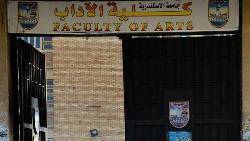The pro-democracy National Alliance for the Defense of Legitimacy said that at least 50 pro-democracy protesters were killed in clashes between police forces and demonstrators on Saturday.
However, Egypt's Health Ministry has confirmed that only 29 people were killed in the Saturday violence.
Imam Youssef, a leading alliance member, told Anadolu Agency that a preliminary death toll from the Saturday clashes hit 50. “This toll might go higher,” Youssef said, blaming the security agencies for the killings.
The police forces used “live ammunition to target peaceful protesters on the streets,” he added.
No security official was available for immediate comment on Youssef’s allegations, but the Interior Ministry has repeatedly denied using live rounds in dealing with protests and stresses that its riot forces are equipped only with teargas and birdshot rifles.
Earlier in the day, sources with the pro-democracy alliance said that at least 10 people were killed and scores were injured in clashes in Al-Alf Maskan district in eastern Cairo.
They added that the same number of protesters died in Cairo's Matariya Square.
Two others were killed in the southern Cairo area of Helwan when security forces tried to disperse a pro-democracy protest there, the alliance sources said.
Meanwhile, three people were killed in similar clashes in the southern Minya province and one in the coastal city of Alexandria, they added.
Eyewitnesses said that security forces had fired teargas at protesters, who responded by throwing Molotov cocktails and stones.
Eyewitnesses said demonstrators had chanted slogans against the Egyptian military and decried Egypt's new constitution, which was recently approved.
A source with the Interior Ministry, meanwhile, said that at least 500 “supporters of ousted president Mohamed Morsi” were arrested during the day’s protests, including 350 in Cairo and 100 in the adjacent province of Giza.
Both supporters and opponents of ousted president Mohamed Morsi took to the streets on Saturday to mark the third anniversary of the 2011 uprising that unseated autocratic president Hosni Mubarak after 30 years in power.
The pro-democracy groups are calling for a "new revolutionary wave" to protest the army's July 3 ouster of Morsi, Egypt's first freely elected president.
But supporters of the army-installed interim authorities, for their part, are using the occasion to call for Defense Minister Abdel-Fattah al-Sisi to run for president.
PHOTO CAPTION
Student protesters gather in the doorway of the Alexandria University Faculty of Arts during clashes between supporters of ousted President Mohammed Morsi and security forces in Alexandria, Egypt, Thursday, Jan. 23, 2014.
AA


 Home
Home Discover Islam
Discover Islam Quran Recitations
Quran Recitations Lectures
Lectures
 Fatwa
Fatwa Articles
Articles Fiqh
Fiqh E-Books
E-Books Boys & Girls
Boys & Girls  Articles
Articles










